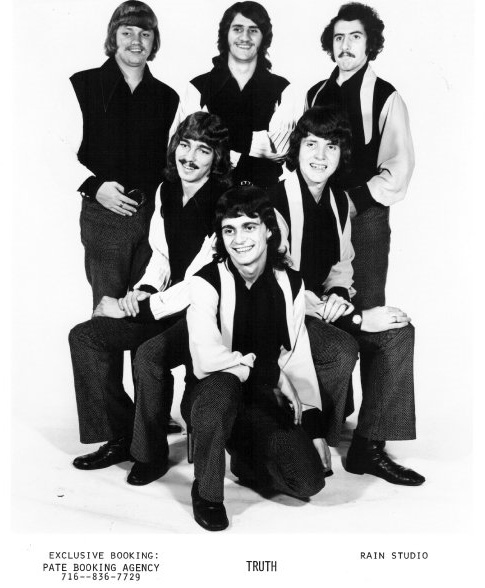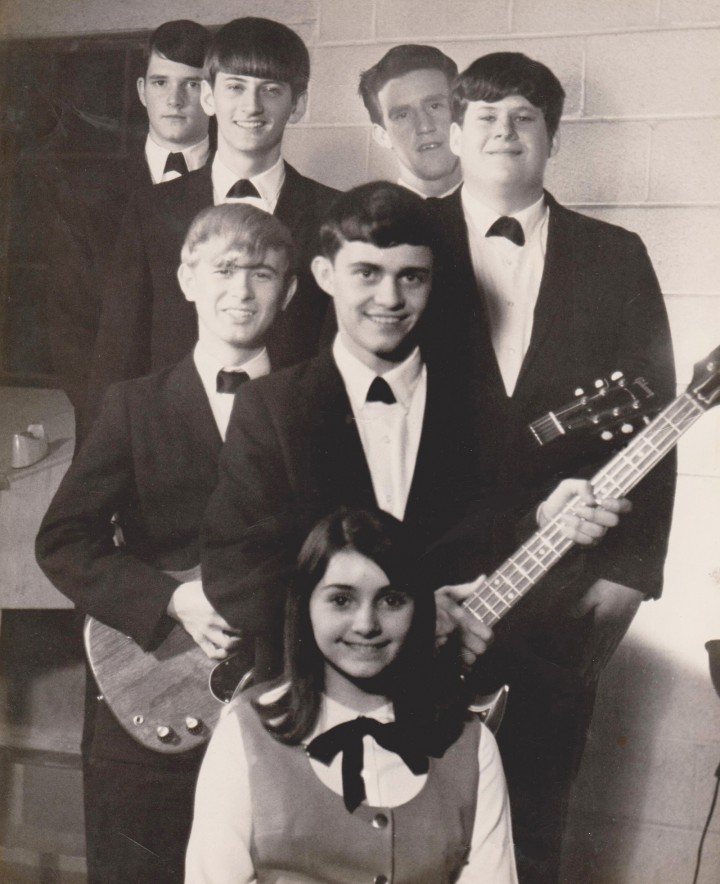
The economic landscape in Martinsville and Henry County is far different today than was the case a half-century ago. In the sixties, the area was the manufacturing hub of Southside Virginia and was home to textile giants DuPont and Tultex, and furniture makers including American of Martinsville, Hooker and Stanley. The boom era provided teens with disposable income and the British Invasion gave rise to a number of excellent bands, including Gene and the Team Beats, the Rogues and the Generals, also known as the Fabulous Generals.
The Generals were based in Martinsville and nearby Collinsville and came together in the spring of 1964 during a school election of senior class officers at Drewry Mason High School in Ridgeway, VA. Guitarist Ronnie Ashworth was an eighth grader and had been playing music with pianist Joe Merriman. The two rehearsed in the cafeteria after school during football practice and knew they had something going when other students stopped by to listen. Drummer Frankie Divers was one of those who heard the duo and asked if he could sit in with them. He soon convinced Joe and Ronnie to play on behalf of one of the election parties.
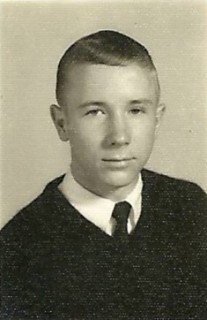
The rival political factions in the school election were dubbed the “Generals” and the “Beatles” parties, in homage to the Beatles recent appearance on the Ed Sullivan Show. Ashworth recalls that “We were representing the Generals party and so we took that name for the trio.” He says the band didn’t have a name and the “Generals” moniker stuck. He doesn’t recall which party won the election but says the Generals “made a hit as a band.”
The trio played the Surfaris’ instrumental “Wipe Out” for the class election, with Ashworth on a Kay electric guitar and a small, Silvertone amp; Merriman on the school’s stand-up piano; and Divers pounding out the rim shots on a white snare drum.
Divers played with the Generals briefly, but left the group to join the football team. Ashworth’s uncle, Bobby Henderson, was asked to play bass in the spring of 1964 and Lee Moore joined shortly thereafter as drummer, along with Mack Davidson on rhythm guitar.
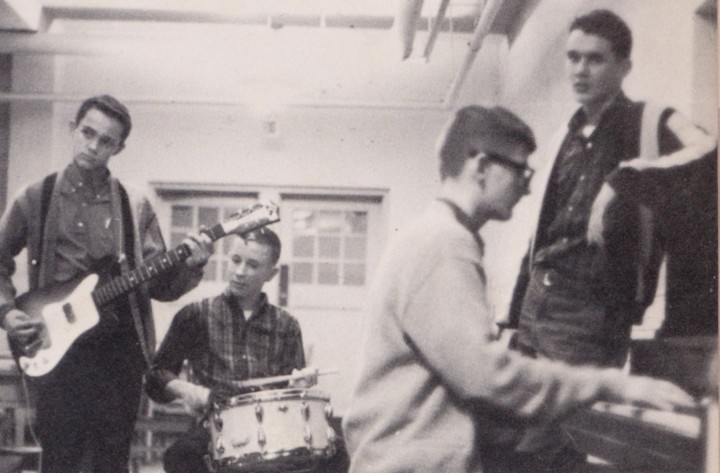
Left to right: Ronnie Ashworth, Frankie Divers, and Joe Merriman.
Henderson recalls that Ashworth and his sister, Fairy, both attended Drewry Mason High School in Ridgeway, along with Merriman and Davidson. Ronnie and Fairy would share the lead vocal chores.
The Ashworth family has always been musically inclined. Ronnie admits “most of the musical talent is from my mom’s side.” When his mother was growing up, she sang bluegrass and gospel in a small group in the mountains of Southwest Virginia, around Saltville and Marion. She taught Ronnie a few chords on his first guitar and he took it from there, learning from records. Ronnie and his sister sang together as young children. He took up the guitar and Fairy was soon to be part of the group. Their younger brother, Dennis, sang and became an accomplished drummer, joining his older siblings on stage in the late seventies in the group Eastwinds.
Ronnie’s introduction to the stage came in 1962 when the pre-teen played at a talent contest at the Fieldale Community Center. He “was about 12 years old” and was just learning to play the guitar. He performed Ricky Nelson’s “They’ll Never Be Anyone Else But You” and the Cascades’ song, “Rhythm of the Falling Rain.” He won the competition and used the $50 prize to purchase his first electric guitar.
Ronnie said he “always felt like we were supposed to play music” and forming a group seemed to be “the next phase: to get together with a few people and just play some.” The Ashworth siblings were budding songwriters and penned both sides of the group’s first single: “You Make Me Happy” b/w “Without You.”
He doesn’t recall Smith participating in the session, but says “they had a really good studio engineer there who seemed to know his stuff.” The Generals did their first take of “You Make Me Happy” and “then he played it back through these big Altec Lansing speakers, and it was just amazing!” Ashworth explains that the band “never really heard ourselves play, but we could hear everything through those speakers. That’s what I remember, just how good it sounded.”
Henderson believes Arthur Smith was present for the recordings, describing him as a hands-on producer who supervised the production, mastering and pressing of their initial offering, which was released on General Records. This was the first time that he had been in a recording studio and Henderson concedes he was “scared to death” and “surprised that actually we were able to play music and listen to it.”
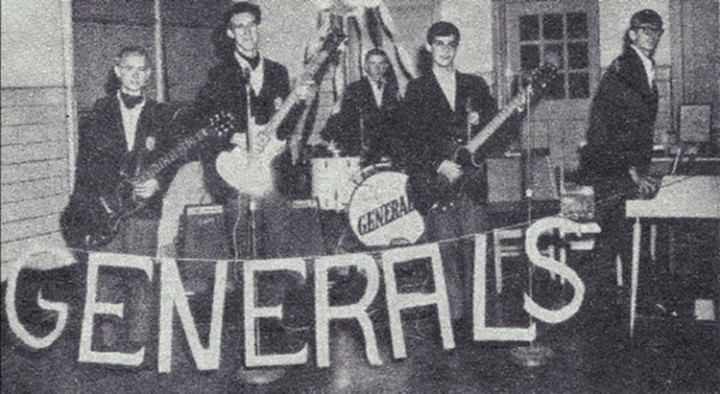 The line-up on the first sessions (and for the second single on Pyramid Records) featured Ronnie Ashworth on lead vocals and guitar; Fairy Ashworth on harmonies; Joe Merriman on organ; Bobby Henderson, bass; rhythm guitarist Mack Davidson; drummer Lee Moore; and David Daniel on saxophone. While barely noticeable on the first recordings, Daniel’s sax was featured prominently on the follow-up, “Life’s Not Worth It.” Ronnie says Daniel was from Collinsville and played with the band “for about a year.”
The line-up on the first sessions (and for the second single on Pyramid Records) featured Ronnie Ashworth on lead vocals and guitar; Fairy Ashworth on harmonies; Joe Merriman on organ; Bobby Henderson, bass; rhythm guitarist Mack Davidson; drummer Lee Moore; and David Daniel on saxophone. While barely noticeable on the first recordings, Daniel’s sax was featured prominently on the follow-up, “Life’s Not Worth It.” Ronnie says Daniel was from Collinsville and played with the band “for about a year.”
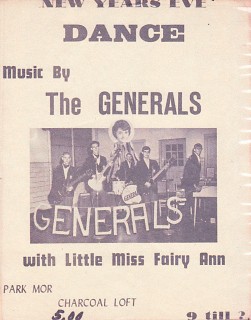 The influence of the Beatles and the Dave Clark Five is apparent on both sides of the single, with its infectious harmonies and strong hooks.
The influence of the Beatles and the Dave Clark Five is apparent on both sides of the single, with its infectious harmonies and strong hooks.
According to Henderson, the recording session and the 45s were the grand prize for winning a battle of the bands in Danville, Va. The two-day marathon featured dozens of rock and soul bands performing on flatbed trucks in the parking lot of the then new Ballou Park Shopping Center.
Ronnie doesn’t recall the prize for the competition, but believes both singles were recorded prior to the band marathon in Danville, which was held in the summer of 1967. Fairy was with the band for both recordings but had left the band by that time, rejoining the Generals in 1968.
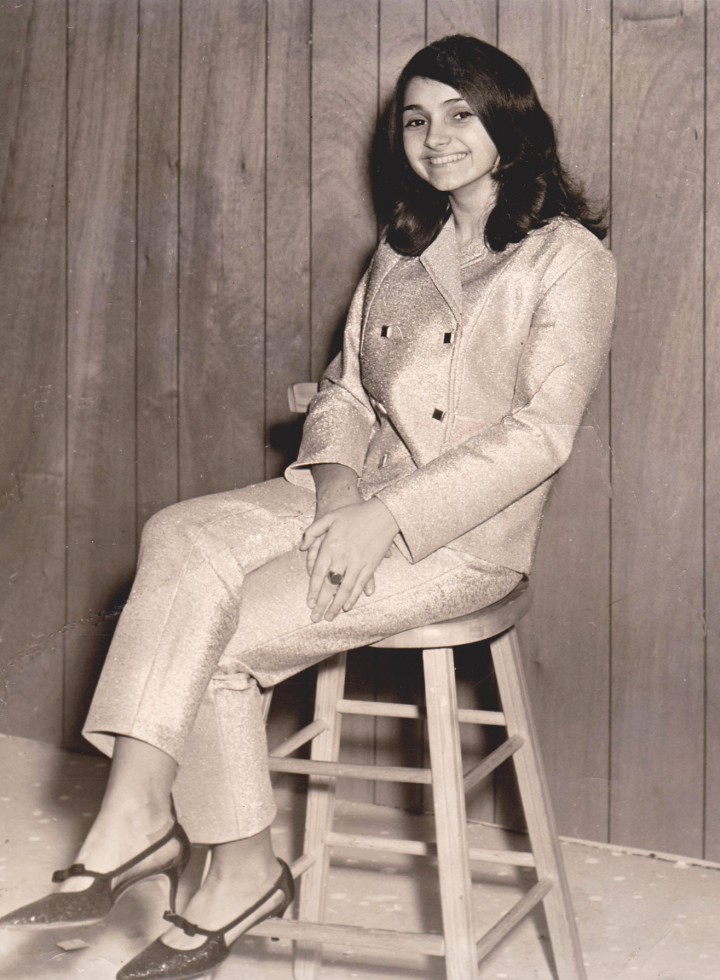
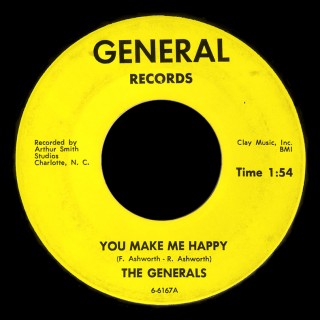 In his detailed history of 1960s garage bands, Teenbeat Mayhem!, author Mike Markesich painstakingly traces the timeline for all recordings produced through Arthur Smith Studios, including both releases by the Generals. In an interview for this article, Markesich notes that all of the discs produced by the studio were made by Kaybank, and all “Kaybank pressings handled accounts in sequential order.” The matrix numbers indicate the first single on General Records (“You Make Me Happy”) was recorded in January of 1966, with the follow-up on Pyramid Records (“Life’s Not Worth It”) recorded in the same studio in September of that same year.
In his detailed history of 1960s garage bands, Teenbeat Mayhem!, author Mike Markesich painstakingly traces the timeline for all recordings produced through Arthur Smith Studios, including both releases by the Generals. In an interview for this article, Markesich notes that all of the discs produced by the studio were made by Kaybank, and all “Kaybank pressings handled accounts in sequential order.” The matrix numbers indicate the first single on General Records (“You Make Me Happy”) was recorded in January of 1966, with the follow-up on Pyramid Records (“Life’s Not Worth It”) recorded in the same studio in September of that same year.
Markesich adds that Amos Heilcher put the pressing account number on the actual record from these custom client accounts and “there is no arguing to the contrary; neither Generals 45 was recorded or released in 1967. Given the absence of paperwork from the era, these pressing plant codes yield a firm time frame, almost down to a couple of weeks (and) within a month.” That substantiates this writer’s memory that the first 45 was offered for sale for $1 at the conclusion of the Danville performance in 1967.
The competition at the Ballou Park Battle of the Bands was stiff, with Ruffin’s VI Pak winning the preliminary round on Friday and the prize of a one-off recording (“Whatzit?” b/w “Boot-Leg” on Hippie Records) at the House of Sound Studios on the Piney Forest Road in Danville.
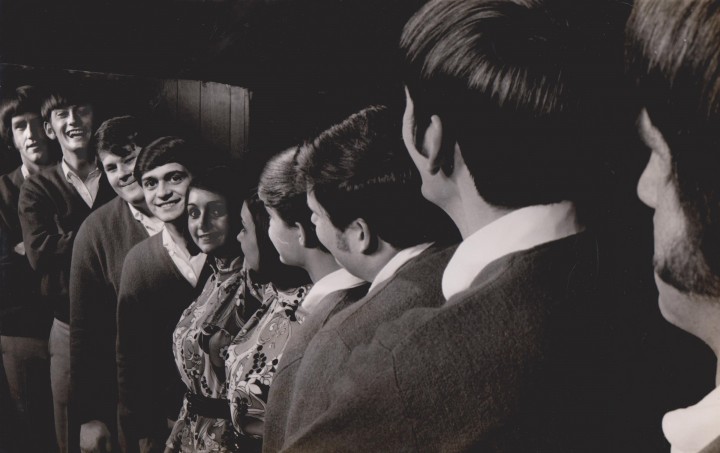
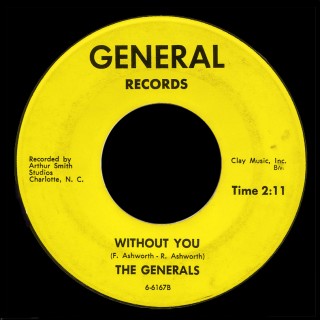 The Generals captured the top prize and were the last band to take the stage Saturday afternoon. Dressed in matching suits, the band at this point was fronted by vocalist Debra Carol Crowder. Ronnie explains that his sister left the group in the fall of 1966 to be a cheerleader, although Fairy would rejoin the Generals several times over the six years the band was together. Another female vocalist was needed and the band decided on Debra, who was the daughter of band manager Troy Crowder. While she had not been a singer prior to that time, Ronnie says she had talent, “so we put her as the lead girl singer and that seemed to work out for a year or two.”
The Generals captured the top prize and were the last band to take the stage Saturday afternoon. Dressed in matching suits, the band at this point was fronted by vocalist Debra Carol Crowder. Ronnie explains that his sister left the group in the fall of 1966 to be a cheerleader, although Fairy would rejoin the Generals several times over the six years the band was together. Another female vocalist was needed and the band decided on Debra, who was the daughter of band manager Troy Crowder. While she had not been a singer prior to that time, Ronnie says she had talent, “so we put her as the lead girl singer and that seemed to work out for a year or two.”
This writer was present for the Danville Battle of the Bands and crowd response was tremendous, especially when Crowder did her interpretation of the Jefferson Airplane’s “Somebody to Love.” The band finished its set and autographed 8x10s for fans before WYPR emcee Glenn Scott announced that the Generals had won the competition.
Henderson admits he was “surprised because there was some good talent over the weekend.”
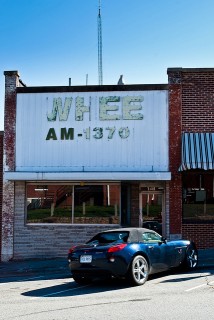
He remembers that their first 45 had an initial run of 500 copies, but believes the band ordered another 500 at some point.
The band sold their new single at concerts and to friends, but did little to promote the 45 outside Southside Virginia. Ronnie remembers taking a copy to Hank Hedgecock at WHEE Radio in Martinsville and said the deejay “just loved them” and he “played them quite a bit, actually.”
Ecstatic to have one his songs on the airwaves, Ronnie was deflated when he went back to school and no one said anything about it. He asked a group of friends if they ever listened to radio and one replied: “Yea, we heard it, just don’t let it go to your head.”
The song was also played “quite a bit” on another Martinsville station, WMVA, by DJ Paul Miller, host of the popular “Night Train” program.
Henderson has a slightly different recollection, saying the single “received minimal airplay” in the Martinsville area, but fared better in other regions of Virginia and North Carolina. The band sold “quite a few of them” and Ronnie believes they moved the initial run, although he admits the band never promoted the single “in a big way.”
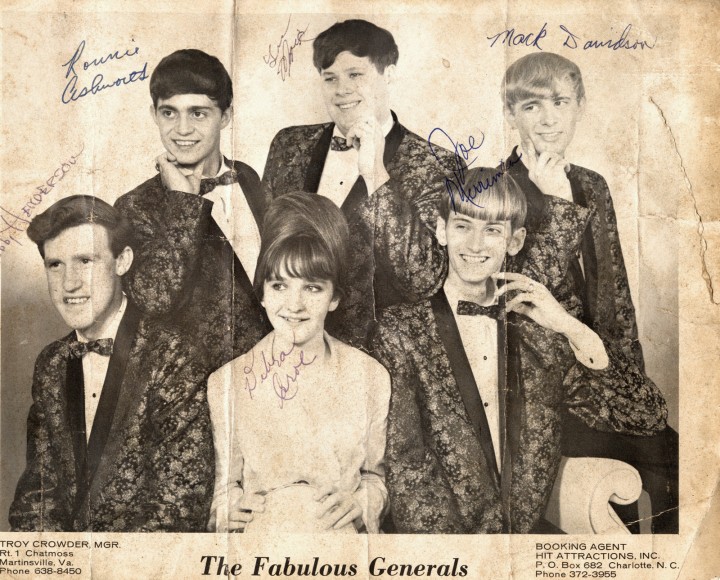
By this point, the Generals were playing extensively throughout Virginia, North Carolina, South Carolina and East Tennessee. Ronnie notes the band “was very popular,” playing country clubs and fraternities at UVA, Hampton-Sydney, Duke, Wake Forest, UNC Chapel Hill and the University of Tennessee.
Henderson remembers the band playing “whatever was available” and booking larger clubs in Atlanta, Raleigh, Charlotte, and even traveling as far south as Florida.
Hit Attractions in Charlotte booked the band exclusively and many of their engagements were for fraternity parties along the East Coast.
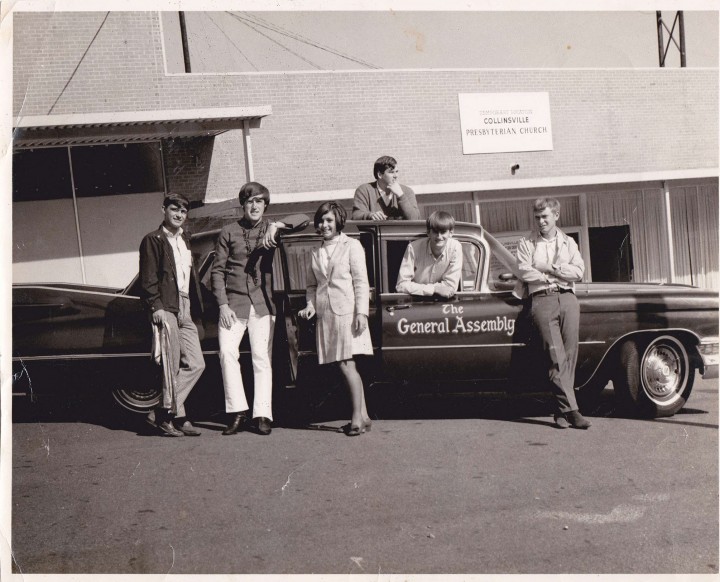
Weekends meant long road trips and little time for football games and other high school activities. To ease life on the road, the band purchased a huge Cadillac limousine, stowing their gear in a band trailer hauled to their gigs. With its huge fins and “The General Assembly” painted on the doors, the ride was quite a sight to behold. Ronnie recalls that “people always looked,” although most members were asleep on the return trips.
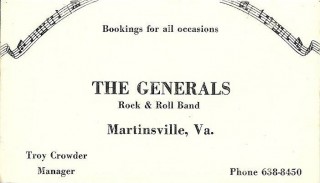 Local engagements included the Martin Riding Stables, where the Generals “played maybe every Wednesday night for a couple of years.” Truxton Fulton (keyboard player with the Stones Unturned of Danville and Sammy Hawks and the Satisfactions of Farmville) recalls hearing the group there, describing it as “a strange venue, like a horse farm, but it was packed.” He says the Generals were “a really good group,” adding: “My whole band was there and they were real nice to let us sit in. I think he (Joe Merriman) had a (Farfisa) Combo-Compact (organ), a step up from what I had.”
Local engagements included the Martin Riding Stables, where the Generals “played maybe every Wednesday night for a couple of years.” Truxton Fulton (keyboard player with the Stones Unturned of Danville and Sammy Hawks and the Satisfactions of Farmville) recalls hearing the group there, describing it as “a strange venue, like a horse farm, but it was packed.” He says the Generals were “a really good group,” adding: “My whole band was there and they were real nice to let us sit in. I think he (Joe Merriman) had a (Farfisa) Combo-Compact (organ), a step up from what I had.”
Ronnie admits the riding stable was an unlikely night spot but says it “had an upper loft that made a great place for a dance (and) was packed out on many occasions.” He remembers performing the Lovin’ Spoonful’s, “Summer in the City” and “playing Wooly Bully to death” in 1965-66.
As requests for the band increased, Troy Crowder was brought on to manage the group after the Generals had been together for about a year. Ronnie explains that “we just felt we needed a manager, somebody who would go out and kinda talk up the group and help book us some jobs.” Crowder was a friend of Mack Davidson’s father, B.J., and they worked together at Continental Can Company. B.J. recommended Crowder, who was brought on board and immediately began finding work for the band. Ronnie says “we all went out booking jobs one day… and drove toward Danville (and) booked the group into a VFW Post.”
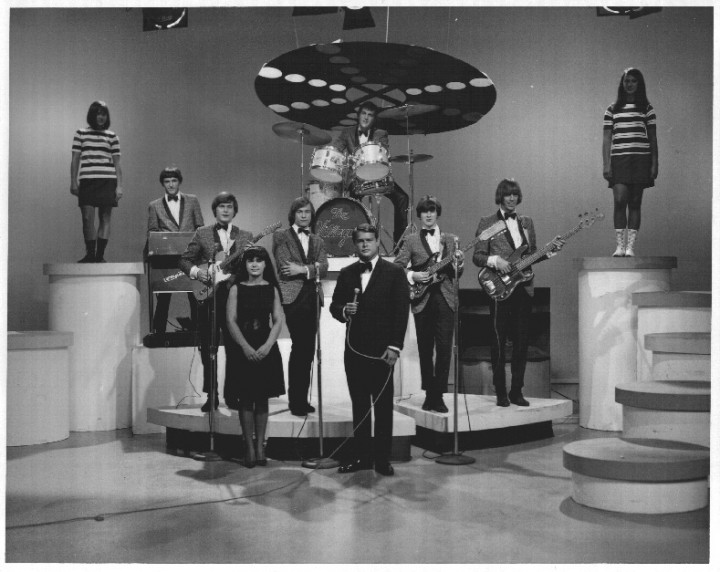
The band was heavily influenced by a South Carolina group, the Villagers. The Villagers were fronted by lead singer Dana Douglas and were regulars on the nationally syndicated television series “The Village Square,” which showcased regional and national talent and ran from 1964-1968. Ashworth says the Generals “basically idolized the group and copied them as much as possible,” and credits the Villagers with contributing to the band’s “style and sound.” The Generals traveled to South Carolina in 1965 and again in 1966 to hear the group perform at the Myrtle Beach Pavilion. Their paths would cross three years later when Ronnie was in college in Georgia.
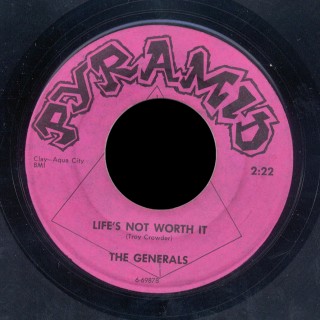 While their second 45 was pressed on Charlotte’s Pyramid Records, both sides were recorded at Arthur Smith. For their return trip, Henderson says the band again decided to tap the songwriting talents of their lead vocalists. “Life’s Not Worth It” and “For What More Could I Ask” feature guitarist Ronnie Ashworth and his sister, Fairy, on lead vocals, respectively.
While their second 45 was pressed on Charlotte’s Pyramid Records, both sides were recorded at Arthur Smith. For their return trip, Henderson says the band again decided to tap the songwriting talents of their lead vocalists. “Life’s Not Worth It” and “For What More Could I Ask” feature guitarist Ronnie Ashworth and his sister, Fairy, on lead vocals, respectively.
While credited to manager Troy Crowder, Ronnie says he wrote both sides. Ashworth said his parents weren’t with him to sign the studio paperwork, which included verification of songwriters. And since he was under 18, authorship was credited to an adult “to avoid copyright infringement issues.”
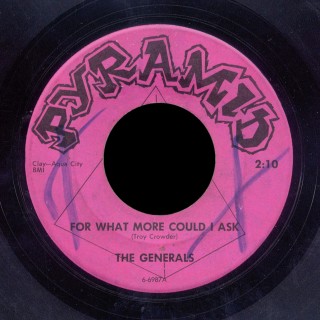 The group financed this release and Henderson says members again made a conscious decision to record original material, pointing out that their band “wrote a lot of the music we did in our live shows (some of which was never recorded) and even the covers that we did took on a personal flavor.”
The group financed this release and Henderson says members again made a conscious decision to record original material, pointing out that their band “wrote a lot of the music we did in our live shows (some of which was never recorded) and even the covers that we did took on a personal flavor.”
Ronnie concurs, pointing out that they “had some original songs and that just seemed to be the way to do it.” He notes the Beatles “were big and it was a new sound and everybody was getting on the bandwagon,” adding: “It was easy to write music back in those days, so why do somebody else’s stuff when you can write your own?”
According to Henderson, their second 45 fared much better. He says while “Life’s Not Worth It” was the “plug” side, both songs received considerable airplay.
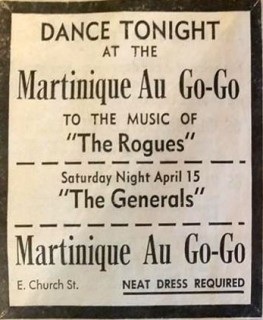 With the music scene changing, the band “tapped into the California/West Coast music scene” and psychedelia.
With the music scene changing, the band “tapped into the California/West Coast music scene” and psychedelia.
In 1968, the group landed a regular gig at the Park Mor Restaurant in Martinsville, attracting a loyal following for their Sunday night performances.
The Generals drove to Tennessee (Ronnie believes it was Johnson City) in late 1968 to provide backup for singer B. J. Thomas. The group set up, rehearsed “Hooked on a Feeling,” and went through a sound check before being informed that Thomas had been detained and would not be appearing.
A little known chapter in the Generals history followed in 1969, when Bobby, Fairy and Ronnie moved to Atlanta, where Ronnie attended school. The trio kept the Generals name alive for another year or so, playing jobs booked previously at colleges throughout Virginia and North Carolina.
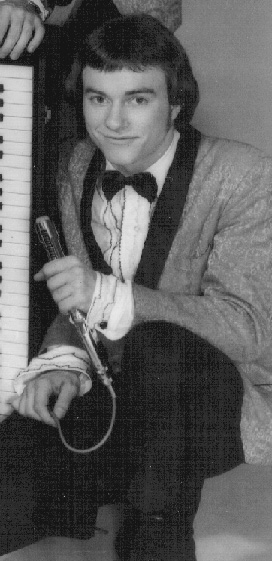
Dana Douglas (of the Villagers fame) was also living in Atlanta at the time and became the group’s lead singer. His friend, Wes Braxton, was a proficient sax and flute player and also joined the line-up. Blake Coverstone — originally with the Divots of Roanoke — was recruited on drums and the six created what Ashworth describes as an “intense” sound. This was late in the psychedelic era and Ashworth says the revamped Generals leaned heavily to the California sound. Douglas “could dance just like James Brown” and was also an accomplished musician, playing keyboards, guitar and other instruments.
At the time, Ronnie was attending a Bell and Howell electronics school with Coverstone. While the original Generals hadn’t broken up as such, the others “had gone off to college because we had graduated from high school and so everybody was kind of going their separate ways.” The core of the original group remained constant, as Fairy was also living in Atlanta and Henderson and his wife and young family had also relocated there. Ronnie explains that “Bobby knew that Dana Douglas lived there, so we had gone by and seen him” and asked Douglas about fronting the Generals.
Technically, the Generals had not broken up. According to Ronnie, they “still had jobs booked, but really the group wasn’t together in the sense that it had been before… the name was still there; the jobs were still there; and the three of us were still playing together. So we just added a few folks and just kept the name, just reorganized the band.”
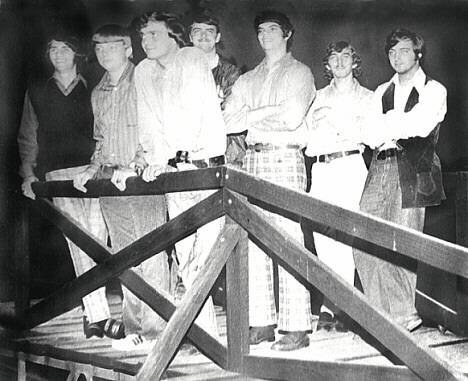
From left: Jim Stone, Mark Anthony, Ronnie Ashworth, Terry Chitwood, Art Kramer, Ronnie Stone and Mike Arnold.
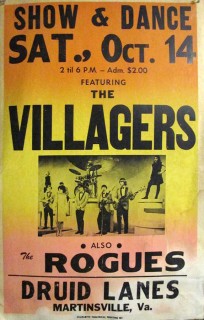 The group never entered the studio again, but continued performing through 1969, when the Generals disbanded and Ronnie Ashworth joined another Martinsville band, the Rogues, just as the group was expanding and adding horns.
The group never entered the studio again, but continued performing through 1969, when the Generals disbanded and Ronnie Ashworth joined another Martinsville band, the Rogues, just as the group was expanding and adding horns.
Ashworth, Mark Anthony, Ron Stone, Jim Stone, Mike Arnold and Art Kramer joined forces with former Soulmasters Doug Hyler and George Parrish as the Rogues evolved into the band Truth, touring extensively and recording one single. The line-up featured four horn players: Hyler and Kramer on sax and Parrish and Ron Stone on trumpet. Arnold was the original drummer, later replaced by Paul Mitchell. Stone was the band’s bassist; Ashworth handled vocals and guitar; and Anthony was Truth’s keyboard player.
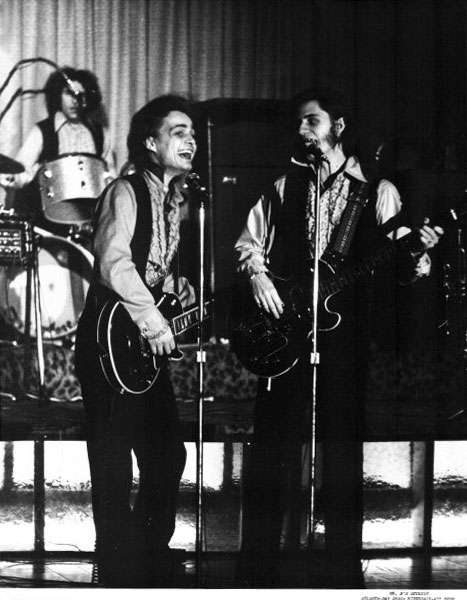
After leaving Truth and coming off the road in 1974, Ronnie played guitar in Dallas “Moon” Mullins’ house band at Moon’s Danceland in Madison, N.C. Moon Mullins and his band — the Night Raiders — are best remembered for their 1958 recording on Profile Records, “Bip Bop Boom,” which featured rockabilly vocalist Mickey Hawks. The 45 sold well in the Chicago area, but failed to catch on nationally. Ronnie played in Moon’s band for about three years, ending “probably in late 1977.”
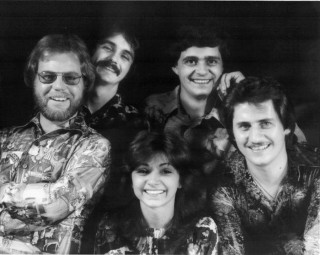
East Winds followed (with Fairy and Dennis) and the band played the Martinsville/Collinsville area in the late seventies, including regular performances at the local Holiday Inn. From a musical standpoint, Ronnie says East Winds “was probably the best (band) I was ever with” featuring “strong three- and four-part harmony, and really good musicianship.” Ronnie and Fairy were the band’s lead vocalists and guitarists (Fairy on acoustic); brother Dennis was the drummer; Jim Stone handled the bass; and Jerry Davis was their keyboard player. The group ran about two years, from mid-1977 until ‘79.
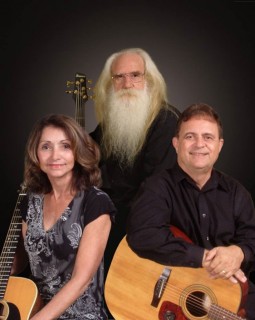
Ronnie Ashworth remains active in the music ministry at his church and still plays with band mates Fairy Ashworth Coleman and Bobby Henderson as Over Easy, a trio that specializes in classic rock by artists like James Taylor, CSN&Y and the Beatles.
After the Generals, Henderson played with various touring bands throughout the Midwest and Southwest. He later returned to Southside Virginia, where he now plays in several groups and operates his own sound production company.
Keyboardist Joe Merriman died recently, but all of the surviving band members remain friends and still see each other on occasion. David Daniel’s whereabouts are unknown.
As for their recordings, Henderson says he has no favorites and “enjoyed doing all of them” and is pleased that the band is still remembered more than 45 years after their last performance.
Looking back on his six years with the Generals, Ronnie says the band had a powerful impact on his life, allowing each member “to stand out in the crowd” and teaching him that he “could accomplish what (he) set out to do.”
Music was something they all took seriously, with endless rehearsals and long road trips that could start early on a Saturday and take 12 to 16 hours to complete, with packing, driving, set-up, performing and then breaking down the gear for the trip home. They had fun along the way but Ronnie admits “you had to love it or you wouldn’t do it.”
While there was anxiety over the war in Vietnam and social conflict in America, he says the band allowed them to all be part of “an exciting musical revolution” the likes of which the world has not seen since the sixties.


